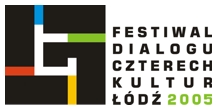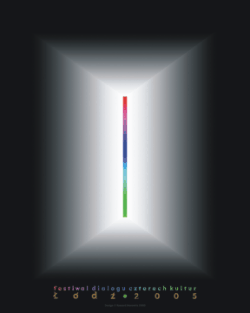4th edition
The fourth edition, which lasted from 26 August to 4 September 2005, focused on German culture. It was related to the celebration of the Year of German-Speaking Countries in Łódź. German theatre was represented at the Festival by two groups, Rimini Protokoll and Gob Squad. Rimini Protokoll, associated with Berlin’s Hebbel am Ufer Theatre, showed Deadline, a play about the business of death. Walking the line between documentary and fiction, the performance was a piercing exploration of the issues of funeral ceremonies and death treated as an opportunity to make money, which had immediate relevance to the notorious case of the “skin hunters” in Łódź. Gob Squad, a group of British and German artists that specializes in artistic intervention in social space, presented a show called Super Night Shot.
The German section featured the work of Leni Riefenstahl, who is mostly associated with the propaganda films of Nazi Germany. There was a show of her photographs and films, as well as a discussion entitled “Can Leni Be Forgiven and for What?” Another highlight was the exhibition Argumenta by Gerhard Jürgen Blum-Kwiatkowski, which presented a portion of his collection of modern art, including works by Roman Opałka, Zbigniew Dłubak, Henryk Stażewski, Józef Robakowski and Victor Vasarely.
Music lovers could choose from many interesting offerings, such as a concert by the internationally acclaimed Latvian violinist Gidon Kremer, Arvo Pärt’s Kanon Pokajanen performed by the Estonian Philharmonic Chamber Choir, Valentin Silvestrov’s Requiem for Larissa performed by the AUKSO Orchestra, or a rendition of “Va, pensiero” by the Choir and Symphony Orchestra of the Wielki Theatre conducted respectively by Marek Jaszczak and Tadeusz Kozłowski. The Tomasz Stańko Quartet played and Ewa Bem sang for jazz fans. The concerts of Tomasz Stańko, Valentin Silvestrov and Arvo Pärt celebrated the achievement of the famous Munich record label ECM, which specializes in jazz and contemporary music.
Most of the events took place in city spaces: as usual in Schiller Passage and the Stary Rynek, at the Galeria Łódzka, and even in the car park at 83/85 Pomorska Street. They were accompanied by discussions and conferences organized by the European Institute.
Michał Merczyński, who was the artistic director of the Festival for the last time, emphasized the ludic nature of the enterprise: “There are three criteria that make the programme a great event: it is a festival of art, a celebration of Łódź, and a huge fête.&rdquo

Festival poster



